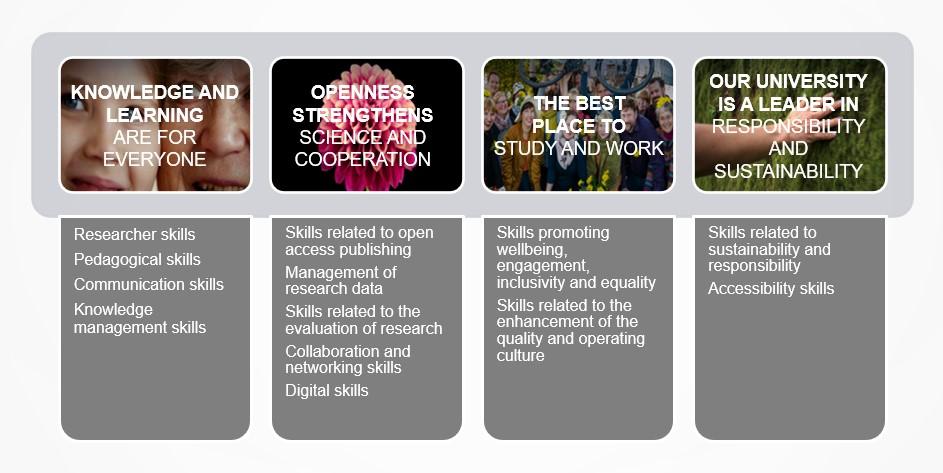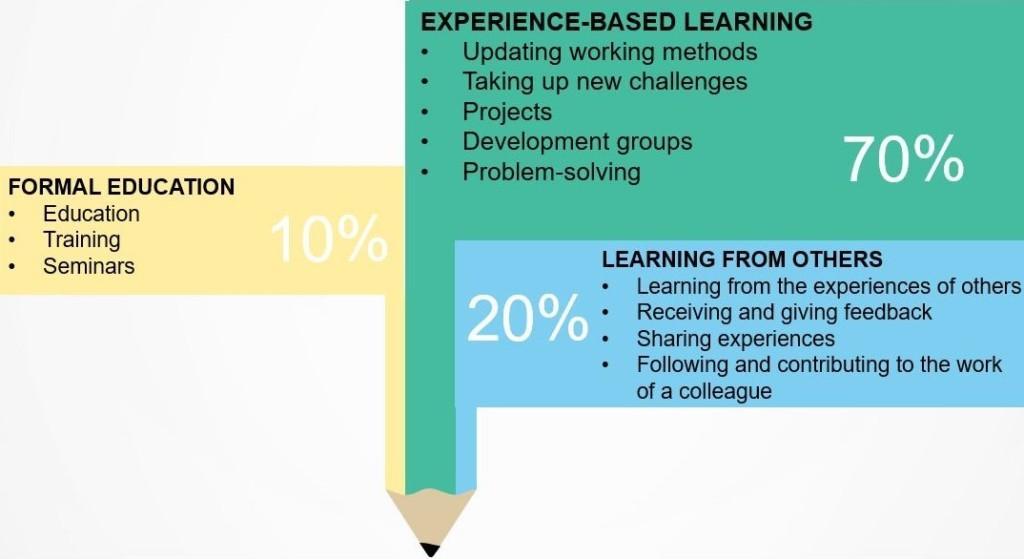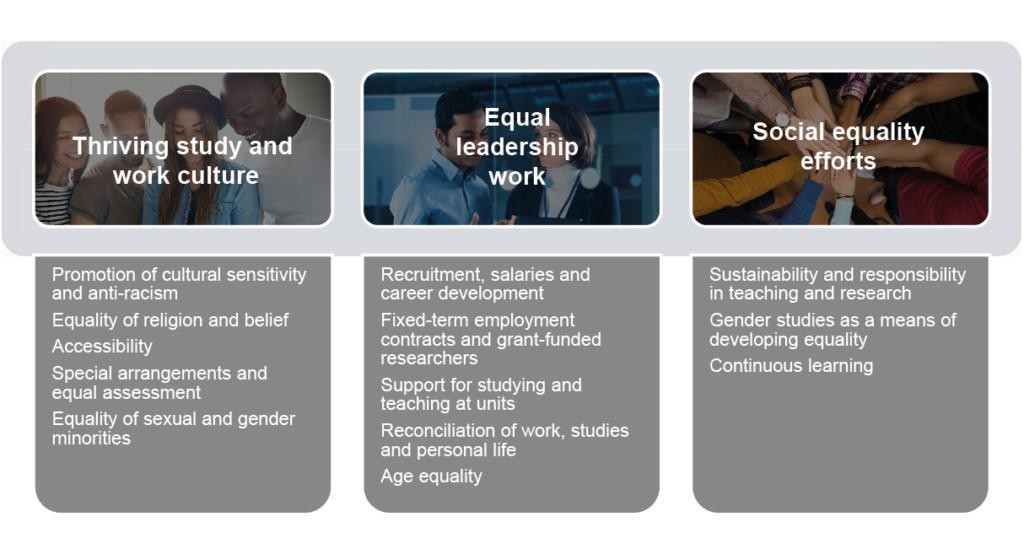Good systems are in place for identifying and following up on staff competence needs
The University of Helsinki has very good and systematic structures in place for evidence and strategy-based activities to support the development of staff competencies. Priorities for staff training are identified annually based on the strategic priorities of the university, which is a commendable approach. There are systematic processes in place with target and development discussions and work plans for teaching and research staff, although more unified practices would be needed at the university in terms of work plans, as noted in the SAR. As described in the SAR and on Flamma, the university uses a framework for skills development based on which most of the skills development are founded on experience-based learning and learning from others. The actual training part only comprises 10%. This approach can be visible from the other methods and tools now on offer, such as counselling, coaching and mentoring, job shadowing and enrichment. During the audit visit, good examples were provided for instance on the coaching and mentoring of young researchers who were mentored by senior professors in writing research proposals and grant applications.
Overall, the development of staff competence is well supported and coordinated. There are a lot of opportunities for staff to develop their skills, from university pedagogy, digital skills, languages to peer mentoring and self-leadership. In addition, faculties also offer own training and support. Most of the academic staff members participating in the audit had attended the university pedagogy courses. On the other hand, it was noted by some staff and students that there is still variation in the university with some staff lacking training in university pedagogy. Variation between units was also noted. In some units all teaching staff are expected to attend pedagogical training, while in others staff felt it could be more encouraged.
Pedagogical training is not compulsory. From the institutional perspective it is strongly recommended and there are structures in place that are connected to the tenure track system. When new staff are recruited to tenure track positions with insufficient pedagogical skills, they are required to create a pedagogical plan to enhance their skills as part of the tenure track. The plan is made with the staff member’s supervisor who is also supposed to follow up on the training. However, senior academics are left outside this structure.
The Centre for University Teaching and Learning (HYPE) has a crucial role at the university in enhancing the pedagogical skills of its staff. HYPE’s importance in providing tools for curriculum development, e.g., through the pedagogical leadership course, was repeatedly mentioned during the audit visit. HYPE’s courses were generally considered relevant and timely. One challenge mentioned was that the courses are so popular that it is sometimes difficult to get on the courses. Among others, there is increasing interest among doctoral students to attend them. Based on the audit interviews, doctoral students who teach (usually 5% of their time) as teaching assistants would also need some clarification as to what support they can get in developing their teaching skills. Because the capacity at HYPE is limited, it was mentioned that other options are currently being looked into, such as the planned MOOCs course in university pedagogy and collaboration with the Open University.
As already discussed, the Teachers’ Academy can be highlighted as an excellent forum through which practices, experiences and ideas about teaching are shared throughout the university. Staff also mentioned co-teaching, peer learning and assessment, and other collaborative methods for improving teaching as good ways to improve competencies. These types of methods could be encouraged more. This is also in line with the university’s competence development framework mentioned above.
Teachers who are not fully employed at the university but who actively teach in programmes should also be considered regarding their teaching competence. The Faculty of Medicine requires their teachers who have combined positions with the university and the hospital to also partake in teaching courses provided by MediPeda. This structure could serve as an inspiration for other programmes with regular part-time teachers.
The university is exemplary at collecting data and using it for supporting its staff. Examples of such approaches were provided by University Services, faculties and units. For instance, during the pandemic HYPE conducted surveys for both staff and students and used that information for providing various types of activities for teachers in transforming their teaching into online teaching. As in other higher education institutions, a big digital leap that had been planned for years was taken at the university during the pandemic. However, based on the audit discussions, digitalisation leaves some people behind, and online teaching will need to be followed up in the coming years.
Recruitment processes are transparent for research and education
The processes are transparent through clear criteria that are made public on web pages and communicated clearly to applicants for positions as well as people seeking promotion. In particular, the use of criteria for how teaching competence is assessed can be commended as good practice. Some academic staff members noted in discussions that teaching is still an underdog to research, and that teaching and its development should be considered as high a merit as research. On the other hand, it was also noted that this is a wider issue in university culture, and teaching is appreciated at the University of Helsinki more that in many other universities internationally.
Regarding engagement with society, there is a lack of clarity regarding the degree to which it should count in recruitment and career advancement processes. This has also been noted in the SAR and audit discussions and there is an ongoing process to incorporate societal engagement in the recruitment process. The audit team encourages the university to look into opportunities for establishing clear criteria for what is meant by societal engagement, and the degree to which it should have an impact on recruitments and career advancement.
Based on the audit interviews, tenure track system is appreciated as a way to make career advancement processes transparent. There are, however, differences between faculties, and specifically in those faculties with many researchers on fixed term contracts, there is a need for clarity regarding opportunities for competence development.
Well-being of staff is monitored and emphasised through the university’s processes
The university has high ambitions and wants to be ‘The best place to study and work’. The university has clearly invested in staff well-being, as evidenced by others in the work of University Services but also in the work conducted in faculties and units, e.g., in the form of well-being groups. The university collects well-being data regarding staff (biannually). During the COVID pandemic, data has been collected twice from students and staff. The pandemic’s impact on well-being was acknowledged. However, at least based on the discussions during the audit, there was no clear plan as to how this will be dealt with in the future. There is also an emphasis on a healthy research environment, which is regularly surveyed. Data is analysed at different levels and data collection and analysis have clear support from the rectorate.
Well-being groups, that started at grassroot level in some departments, are now implemented widely at the university. Other examples that have spread across the university is the code of conduct, which was initiated in the Faculty of Science and is now implemented across the university. Well-being is discussed with supervisors in the annual development discussions. As can be noted from the SAR and audit discussions, the supervisors are considered as central in terms of staff well-being. HR is also working with supervisors regularly to help them detect any challenges among their staff and enhance work well-being in research group, faculty or unit level.
Well-being was particularly emphasised in the university’s benchlearning activities with the University of Edinburgh (see Chapter 5 of this report). Staff expressed that there was plenty to learn from this exercise and ideas have also been linked to the ongoing strategic development.
Although good structures and university-level principles are in place, based on audit discussions, the university could be more proactive concerning equality, diversity and inclusion. This is also in line with the university’s core value of inclusivity and its strategic developments. Including topics of inclusion, equality and diversity in the annual operations planning process presumably ensures that these topics are kept on the agenda with clear target setting, actions and follow-up linked to them. Based on the operations plans reviewed, many good processes and actions have already been implemented or are planned in connection with inclusion, equal opportunities and occupational well-being of all staff. The audit team also suggests that the university could consider developing an anonymous reporting channel – a whistle-blower system – where individuals can report misbehaviour.


